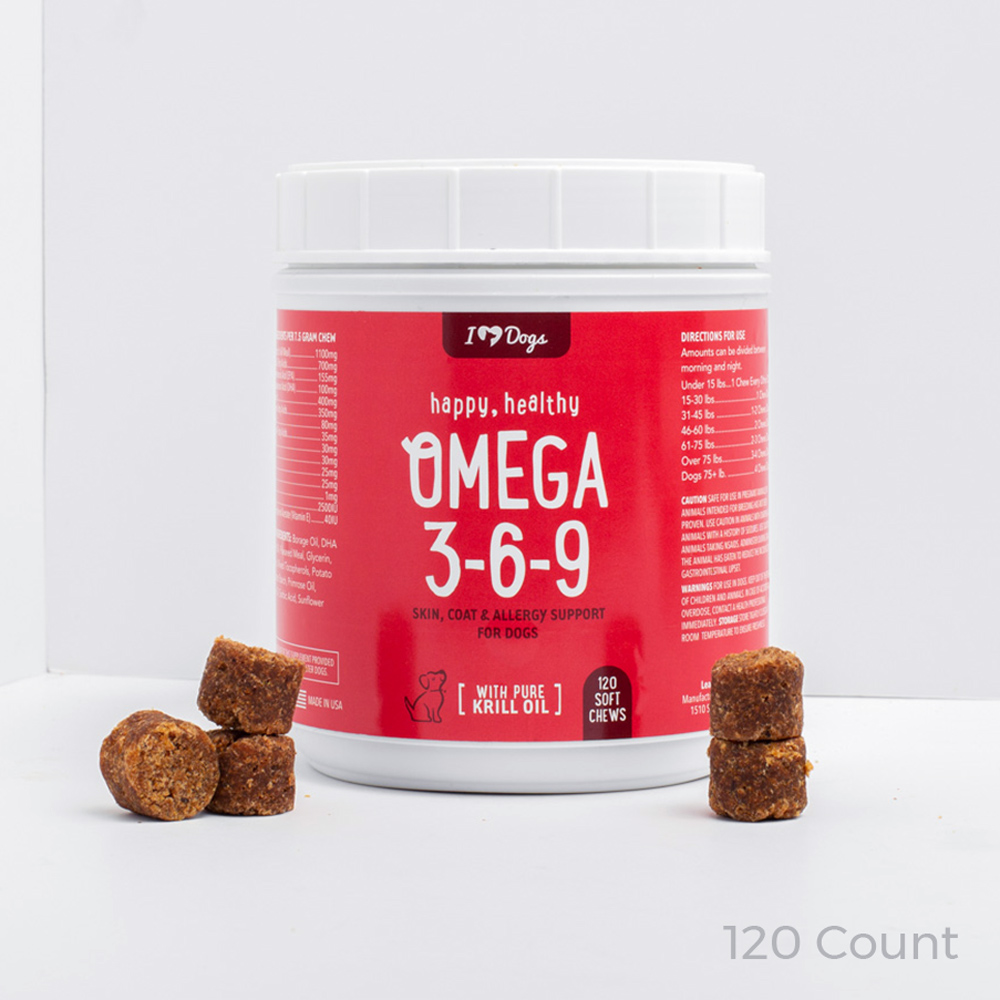Out of all the possible supplements your dog could benefit from, there’s one that stands out for being especially vital. DHA (docosahexaenoic acid) is a type of omega-3 fatty acid found in eggs, certain types of organ meat, and fish. It’s an essential part of a dog’s health, but the canine body can’t produce what it needs. Without the body’s ability to produce it naturally, your dog relies on their diet to satisfy more than cravings. Here are a few of the most common reasons why experts recommend dogs be fed a DHA supplement as part of their daily diet.

#1 – Promotes Brain and Central Nervous System Development
DHA is an essential nutrition used in the development of both the brain and the central nervous system. Giving a pregnant or nursing female dog a DHA supplement effectively benefits the early development and growth of the puppies. Some studies show puppies fed with high levels of DHA are easier to train and socialize. Older dogs also benefit from DHA-enhanced diets. Dr. Amy Dicke, a technical services veterinarian, said in an article with The Dog Daily,
“Healthy brains are about 60 percent structural fat, and 30 percent of the fat in gray matter is DHA, the most abundant fatty acid in the brain.”
DHA is a major building block in the brain, and healthy neuro function is directly dependent on your dog’s diet.
Related: 12 Best Dog Breath Fresheners
#2 – Relieves Allergies
The anti-inflammatory properties of omega-3 fatty acids reduce symptoms caused by allergies. Dry, itchy skin is enough to make your dog miserable year-round. Fish oil, krill oil, and other substances rich in DHA help calm the body’s adverse reaction to specific allergens. When a cell is damaged, arachidonic acid is released and causes inflammation. The presence of omega-3 fatty acids in the cells help stop the production of the inflammatory substances. The result is a pup who doesn’t spend his days finding new ways to reach his relentless itches. DHA isn’t a cure for allergies, but it provides much-needed relief your dog will thank you for.

#3 – Supports a Shiny, Healthy Coat
When your pup’s skin isn’t dry, flaky, and inflamed, his fur will show the difference. Dog owners who regularly feed their pets DHA supplements report noticing a greater shine to their dogs’ coats. The hair will grow in without unsightly bald spots, and you’ll notice an obvious sheen when the sun hits them just right. Most dog owners don’t notice how dull their dog’s coat is until they see it reach its full potential. Your dog will look better and healthier, and there’s also the added bonus of less shedding. Healthier fur will stay on your dog and off your floors, furniture, and clothing.
Related: The 10 Best Calming Supplements for Dogs
#4 – Enhances Joint Health
The same anti-inflammatory properties that help relieve your dog’s allergies will also aid in joint care. As dogs age, the cartilage in the joints becomes thin and inflamed. The bones start to rub against each other, and the painful condition can put a permanent end to your dog’s favorite games. Running, jumping, and eventually even standing will be too painful to bear. Studies indicate DHA significantly reduces the pain and helps older dogs get back in the game.

#5 – Fight Inflammatory Conditions
Skin and joints aren’t the only body parts affected by inflammation. There’s a long list of inflammatory conditions omega-3 fatty acids can help a body fight off. Cummings Veterinary Medical Center says heart disease is one of them.
“Certain types of fatty acids present in fish oil (called omega-3 fatty acids) have been shown to have a positive effect in dogs with heart disease.”
DHA can’t help prevent heart disease in dogs as it does in humans, but studies show it can be used as effective treatment for dogs with altered appetites and muscle loss.
To find the right omega-3 fatty acid supplement to benefit your dog, look for a brand that uses high-quality ingredients. The product should be grain-free, soy-free, and gluten-free as to not cause further problems with food sensitivities and allergies. If you’re not sure which DHA supplement is best or how much you should be feeding your dog, always turn to your veterinarian as a trusted resource.
Happy, Healthy Omega-3-6-9 Select soft chews are excellent sources of omega fatty acids and have been recently revamped to contain krill meal rather than the salmon oil commonly used by other brands. Krill meal packs a significantly more concentrated and pure source of omega fatty acids, making it the superior choice.
Learn More About Our Omega 3-6-9 Select Grain Free Skin & Coat Chews with Pure Antarctic Krill Oil
These statements have not been evaluated by the Food and Drug Administration. This product is not intended to diagnose, treat, cure, or prevent any disease. The information on this website is not intended to replace a one-on-one relationship with a qualified healthcare professional.
- Best Joint Supplement for Dogs
- Best CBD Gummies for Dogs
- Goat's Milk for Dogs
- Skin & Coat Supplements for Dogs
- Weight Gain Supplements for Dogs
- Muscle Building Supplements for Dogs
- Heart Supplements for Dogs
- Multivitamins for Dogs
- Pill Pockets for Dogs
- Digestive Enzymes for Dogs
- Turmeric for Dogs
- Liver Supplements for Dogs
- Tear Stain Supplement for Dogs
- Breath Fresheners for Dogs
- Kidney, Urinary, & Bladder Supplements for Dogs
- Stool Eating Deterrent for Dogs
- Eye Supplements for Dogs
- Melatonin for Dogs
- Apple Cider Vinegar for Dogs
- Green Lipped Mussels for Dogs
- L Theanine for Dogs
- Chondroitin Supplements for Dogs
- MSM for Dogs
- Valerian Root for Dogs
- Chamomile for Dogs
- Boswellia for Dogs
- L Tryptophan for Dogs
- Yucca for Dogs
- Licorice Root for Dogs
- Bromelain for Dogs
- Papain for Dogs
- Devil's Claw for Dogs
- Quercetin for Dogs
- Hemp gummy for dogs
- Best Hemp Dog Treats
- Best Hemp Oil for Dogs
- Best Calming Treats, Chews, & Supplements for Dogs
- Best Bone Broth for Dogs
- Best Fish Oil for Dogs
- Best Probiotics for Dogs
- Best Hip Dysplasia Supplements for Dogs
- Best Colostrum for Dogs
- Best Quercetin for Dogs
- Best Greens for Dogs Supplements
- Best Vitamin C Supplements for Dogs
- Best Probiotic for Dog with Allergies
- Best Taurine Supplements for Dogs
- Best Dog Food Toppers
- Best Anal Gland Supplement for Dogs
- Best Dog Probiotic Powder
- Best CoQ10 Supplement for Dogs
- Best Liquid Glucosamine for Dogs
- Best Wrinkle Creams, Balms, and Wipes for Dogs
- Best Puppy Calming Treats
- Best Colloidal Silver for Dogs
- Best Adaptogen Supplements for Dogs
- Best Cognitive Supplements for Dogs
- Best Bee Pollen for Dogs
- Best Vitamin A Supplements for Dogs
- Best Vitamin E Supplements for
- Best Liquid Glucosamine Supplements for Dogs
- Best SAM-e Supplements for Dogs
- Best Hyaluronic Acid Supplements for Dogs
- Best Apple Cider Vinegar Supplements for Dogs
- Best Diarrhea Medicine for Dogs
- Best Milk Thistle for Dogs
- Best Turkey Tail Mushroom Supplements for Dogs
- Best Astaxanthin Supplements for Dogs
- Best Lutein Supplements for Dogs
- Best Electrolyte Supplements for Dogs
- Best Coconut Oil for Dogs
- Best Prenatal Vitamins for Dogs
- Best Puppy Milk Replacements
- Best Iron Supplements for Dogs
- Best Dewormer Products for Dogs
- Best Mange Medications for Dogs
- Best Cough Relief Products for Dogs
- Best Sinus Relief Products for Dogs
- Best Collapsed Trachea Supplements for Dogs
- Best Fireworks Anxiety Relief Products for Dogs
- Best Thunderstorm Anxiety Relief Products for Dogs
- Best Travel Anxiety Relief Product for Dogs
- Best Supplements for a Dog with a Torn ACL
- Best Supplements for a Dog with Patellar Luxation
- Best Supplements for a Dog with Intervertebral Disc Disease
- Best Zinc Supplements for Dogs
- Best Biotin Supplements for Dogs
- Best Tart Cherry Supplements for Dogs
- Best Resveratrol Supplements for Dogs
- Best Ginkgo Biloba Supplements for Dogs
- Best Ashwagandha Supplements for Dogs
- Best Supplements for Dogs with Cushing's Disease
- Best Adrenal Supplements for Dogs
- Best NAD+ Supplements for Dogs
- Best NMN Supplements for Dogs
- Best Supplements for Dogs with Dementia
- Best Supplements for Dogs with CCD(Canine Cognitive Dysfunction)
- Best Fiber Supplements for Dogs
- Best Spirulina for Dogs
- Best Hairball Remedies for Dogs
- Best Eye Drops for Dogs with Allergies
- Best Magnesium Supplements for Dogs
- Best Brushes for Double-Coated Dogs
- Best Dandelion Root Supplements for Dogs
- Best Probiotic for Dogs with Yeast Infections
- Best Flaxseed Oil for Dogs
- Best Chamomile Supplements for Dogs
- Best Lavender Supplements. Treats & Sprays for Dogs
- Best Collagen Supplements for Dogs
- Best Kelp Supplements for Dogs
- Best Activated Charcoal for Dogs
- Best Slippery Elm Supplements for Dogs
- Best Supplements for Dogs with Seizures & Epilepsy
- Best Antioxidant Supplements for Dogs
- Best Ubiquinol Supplements for Dogs
- Best Hormone & Glandular Supplements for Dogs
- Best Thyroid Supplements for Dogs
- Best Iodine Supplements for Dogs
- Best Dog Shedding Supplements for Dogs
- Best Detox Supplements for Dogs
- Best Postbiotics for Dogs
- Best Aspirin Products for Dogs
- Best Dog Anti-Nausea Products
- Best Dog Mouthwashes
- Best Camelina Oils for Dogs
- Best Hemp Seed Oils for Dogs
- Best Natural Anti-Inflammatories for Dogs
- Best Cancer Supplements for Dogs
- Best Sardine & Anchovy Oils for Dogs
- Best Fatty Acid Supplements for Dogs
- Best Chia Seed Supplements & Treats for Dogs
- Best Olive Oils for Dogs
- Best Amino Acid Supplements for Dogs
- Best Moringa Supplements for Dogs
- Best Echinacea Supplements for Dogs
- Best Cranberry Supplements for Dogs
- Best D-Mannose Supplements for Dogs
- Best Nettle Leaf Supplements for Dogs
- Best Marshmallow Root Supplements for Dogs
- Best Astragalus Supplements for Dogs
- Best Pumpkin Seed Supplement for Dogs
- Best Supplements for a Dog Wetting The Bed
- Best Blueberry Supplement for Dogs
- Best Bromelain Supplements for Dogs
- Best Yucca Supplements for Dogs
- Best Ginger Supplements for Dogs
- Best Rosehip Supplements for Dogs
- Best Allergy Medicines for Dogs
- Best Reishi Mushroom Supplement for Dogs
- Best Maitake Mushroom Supplement for Dogs
- Best Chaga Mushroom Supplement for Dogs
- Best Shiitake Mushroom Supplement for Dogs
- Best Cordyceps Mushroom Supplement for Dogs
- Best Lion's Maine Supplement for Dogs
- Have question? - Ask in our Dog Health Forum

 Toledo, United States.
Toledo, United States.